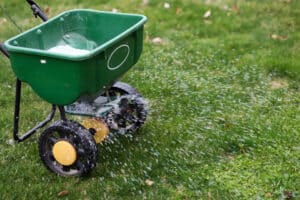When weeds take over your lawn, hand-pulling likely isn’t enough to get the job done. You might manage one or two weeds, but clearing out your whole yard is time-consuming. That’s where lawn weed killers can come to the rescue.
We believe finding the right herbicide for your yard shouldn’t take hours of research, so we’ve rounded up the best of the best. We also break down exactly how each product works, what the label really means, and what to consider before committing to a brand. If you’d rather hire a professional to handle your weedy lawn, check out our list of the best lawn care companies.
Get a Quote From Lawn Professionals Near You
Compare quotes from local pros

Lime Soil Amendment

Lawn Fertilization
Identifying Weeds
Before choosing the proper weed killer, determine what type of weed you’re dealing with. Each weed type requires a different treatment—what’s effective for one may do little or no damage to another.
There are three main categories of weeds: broadleaf, grassy, and grasslike.
1. Broadleaf Weeds
These weeds have broad, flat leaves, so it’s unlikely that you’ll mistake them for grass. They thrive in soil that’s lacking key nutrients and come in different types—annual, biennial, and perennial. Different broadleaf weed varieties require different chemicals depending on their life cycle.
Examples of broadleaf weeds include dandelions, ground ivy, clover, chickweed, dollarweed, thistle, and oxalis.
2. Grassy Weeds
Grassy weeds have leaves that still look somewhat like grass blades. Examples of grassy weeds include crabgrass, quackgrass, goosegrass, and foxtail.
3. Grasslike Weeds
This weed type resembles grass, but its leaves are more tube-like and triangular than flat. Examples of grasslike weeks include garlic, nutsedge, and wild onion.
How Weed Killers Work
Weed killers work by using chemicals that kill the weed or prevent its growth. There are a variety of different herbicide types to treat weeds at different stages of their life cycle or even before they sprout. Here are the main characteristics to consider when choosing a specific weed killer.
Pre- or Post-Emergent
Pre-emergent weed killers target weed seedlings before they get a chance to sprout. If weeds have already popped up, this type won’t help. Post-emergent weed killers are designed to eradicate weeds in their active growing season. Apply post-emergent weed killers directly to the plants’ leaves.
Selective or Nonselective
Selective weed killers eliminate weeds without harming beneficial plants nearby while nonselective herbicides will damage all nearby plants, even if they’re beneficial.
Systemic or Topical
Systemic weed killers attack the entire plant, including its roots. Topical herbicides, on the other hand, only kill areas where the weed killer is applied.
Persistent or Nonpersistent
Persistent weed killers stay active after you apply them to prevent future weeds. Nonpersistent weed killers don’t offer ongoing weed control.
How To Apply Weed Killer
Even if you select the right weed killer, applying it incorrectly could make your efforts fruitless. The wrong application may even cause harm to your lawn.
Many weed killers need to be diluted with water and put in a spray bottle. The product’s label will explain precisely how much water and weed killer you’ll need to combine. Some weed killers, however, come in granular form. Solid weed killers must be applied with a spreader.
Quick Tip
- When trying to get rid of weeds, timing is everything. You don’t want to apply weed killer immediately after mowing your lawn or adding fertilizer since that could harm tender grass. In both cases, wait several days before applying weed killer.
The weather also plays a role in when to apply weed killer. Applying weed killer when it’s too hot may stress your grass while applying it before a rain means it could wash away before getting absorbed. Always read the product’s instructions to know how to use it properly.
Safety Tips for Using Weed Killers
Weed killers offer powerful results, but using these products safely requires care and attention. Always start by reading the product label to understand proper usage, dosage, and application timing. Wear protective gear such as gloves, goggles, long sleeves, and a mask to avoid direct contact and inhalation of chemicals.
Apply the product on calm, dry days to reduce drift and maximize its effectiveness. Keep children and pets away from the lawn during and after application until the area dries completely.
Store weed killers in their original containers and place the bottles in a secure spot far from kids, pets, food, or heat sources. When you finish the product, dispose of the container as directed on the label. Never pour leftovers down drains or onto your lawn’s soil. Practicing safe handling protects your health and the environment while helping your lawn stay lush and weed-free.
How To Prevent Weeds
When it comes to tackling weeds, the best defense is a good offense. You should take these steps to keep your grass hardy and robust, reducing the chance of weeds taking over.
- Water deeply and infrequently: If you want your grass to have strong and deep roots, water deeply and infrequently instead of choosing shallow, daily watering. With deep, sturdy roots, your grass can grow thick and compete with weeds that may try to grow.
- Mow high: Weeds need sunlight to grow. If you let your grass blades grow taller by setting your lawn mower to the first or second highest setting, the grass will grow tall enough to cast shade on any weed seeds, preventing them from sprouting.
- Feed regularly: Stressed lawns are more susceptible to being crowded by weeds. Feeding regularly will keep your lawn lush and make it less hospitable to weeds.
Seasonal Weed Management Strategies
Different weeds thrive in different seasons, so tailoring your lawn care schedule to the time of year helps keep them in check. Consistent lawn care throughout the year not only reduces weed growth but also supports a healthier, more resilient lawn.
- Spring: Apply a pre-emergent herbicide to block summer weeds like crabgrass. Use a post-emergent herbicide to eliminate any perennial weeds that survived winter.
- Summer: Monitor for rapid weed growth triggered by heat and humidity. Pull or spray weeds as soon as they appear to prevent them from spreading. Avoid using chemical herbicides during high temperatures to protect your grass.
- Fall: Apply a pre-emergent herbicide early in the fall season to stop winter weeds such as henbit. Use a post-emergent herbicide to treat broadleaf weeds like dandelions and clover.
- Winter: Focus on routine lawn care while weed activity slows down. If weeds still pop up during the winter months, hand-pull them or apply targeted spot treatments to keep them under control.
The 3 Best Weed Killers
Here are the three best weed killers that our team recommends.
Compare-N-Save
This powerful, fast-acting weed killer battles the exterior part of the weeds it contacts as well as their root systems. Compare-N-Save kills stubborn weeds efficiently, and spraying weeds selectively will make sure that your lawn stays intact.
Preen Garden Weed Preventer
This pre-emergent, selective weed killer offers residual effects, with ingredients remaining active in the soil for three months after application. Preen prevents nearly 30 broadleaf weed varieties without hurting nearby plants.
Scotts Turf Builder Weed and Feed
Scotts’ most powerful weed and feed thickens grass while crowding out weeds. It’s especially effective against dandelions and clover. The company offers a satisfaction guarantee, promising your money back if you aren’t satisfied with its results.
Top Professional Lawn Care Company: TruGreen
If you’re battling stubborn weeds or confused about which weed killer is best, it may be time to call in experts. Our team’s top selection for lawn care, TruGreen, offers both pre- and post-emergent weed control.
The specialists at TruGreen can create a custom-made plan to restore your lawn to its former health and make sure it can compete with future weeds. The lawn care company offers five annual plans with varying levels of coverage in every state except for Alaska and Hawaii.
FAQs About Lawn Weed Killers
How do lawn weed killers work?
Most weed killers work by either disrupting the photosynthesis that gives weeds nutrients or by stopping the methods weeds use to grow roots. The exact method used by each lawn weed killer varies, so look up your particular brand for greater detail.
What lawn weed killer is right for my lawn?
The weed killer that’s right for your lawn depends on the type of weed you’re dealing with and how strong a weed killer you’re comfortable using. Expect to choose between pre- and post-emergent options, selective and nonselective types, systemic and topical solutions, and persistent or nonpersistent weed killers.
What are the best lawn weed killers?
Our team recommends Compare-N-Save, Preen Garden Weed Preventer, and Scotts Turf Builder Weed and Feed as the best three lawn weed killers. Each choice will effectively stymie weed growth while safeguarding your lawn in the process.





